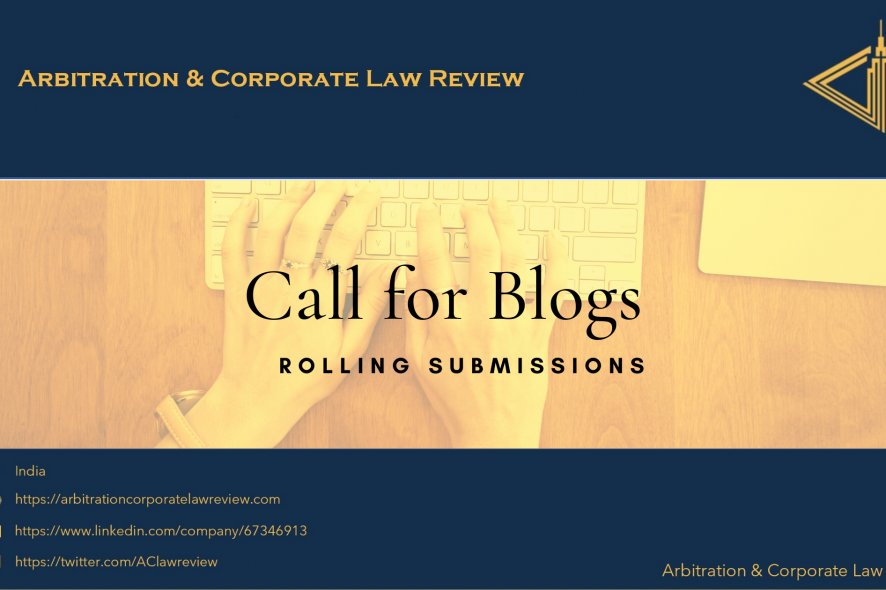The Arbitration & Corporate Law Review “ACLR” invites submissions, including articles, research pieces, opinions, case comments and short notes on Company law, Insolvency law, Securities law, Competition law, Arbitration Law, Law of Taxation, IPR, Trade Law and Employment law. The submissions must be original and unpublished.
About the Blog
The Arbitration & Corporate Law Review is a student run blog founded by three final year students of Maharashtra National Law University Mumbai, and run under the Guidance of Dr Kiran Rai, Head of Department (UG), MNLU Mumbai. The vision is to provide real-time updates and facilitate dialogue on contemporary issues, while collaborating with expert advisors to evaluate and ensure that the content is practically valuable and most relevant. The objective of the blog is to provide constructive feedback through an exhaustive review process while encouraging engagement and promote expression. With a unique blend of industry leaders and students with focus on curating content and making it freely available, ACLR strives to serve as a platform for reviewing reforms in arbitration, corporate and commercial laws.
Advisory Board
The ACLR is fortunate to have a Board of Advisors comprising of Senior professionals from distinguished Domestic and International Law firms like Vidhi Centre for Legal Policy,Finsec Law Advisors, Khaitan& Co., PSL Advocates, ShardulAmarchandMangaldas& Co., Legasis Partners, Acuity Law, United Maritime Law Chambers, and Azmi & Associates. The Board also comprises oflegal academicians with immense experience in the subject areas who area acting as mentors for the initiative. Along with a stellar reputation as professionals, the members of the board also share a keen interest in the academic front of the law and have regularly contributed to the literature and research in their respective fields.
Submission Guidelines
Manuscripts can be submitted through the Google Form in the “Submission Guidelines” page of the website.
- Co-authorship:Co-authorship up to two authors is permitted.
- Plagiarism:The submission should reflect original and unpublished work. A maximum similarity of 15% is allowed. Non-adherence to this rule shall result in rejection of the article summarily with no chance for improvement.
- Length: Submissions must ideally be limited to a length of 1500 words. This limit shall be exclusive of any explanatory endnotes that are added. Non-adherence of the word limit can be allowed only if deemed necessary.
- Formatting: Submissions should be made in Microsoft Word (.docx) format. The submission should adhere to the following formatting style. Font: Times New Roman, Font size:12, Line spacing:1.5. (For Endnotes Font size: 10, Line spacing:1)
- Citation: Relevant sources such as judgments, laws, treaties, news article and other legal texts must be added as hyperlinks in-text. Where sources are not available as open-source documents, Endnotesmay be added adhering to the uniform Bluebook 20th Edition citation style.
Review Process
- An exhaustive two-tier blind review process is undertaken with a strict deadline adherence (maximum of seven days).
- The Editorial Board retains complete discretion over acceptance or rejection of manuscripts.
- Every article undergoes a comprehensive two-tier review and is sent back with comments for improvement, suggested changes,or cogent reasons for rejection/selection.Acceptance of a manuscript for publication is contingent on the incorporation of such suggestions to the satisfaction of the Board of Editors.
- The final decision of the editorial team shall be conveyed within the timeline of 7 days subject to response of the authors in case the article is sent back for revision.
Upon acceptance of the manuscript for publication by ACLR, the copyright over the manuscript is vested with ACLR. However, the moral rights over the manuscript shall vest in the author(s).If any author wishes to cross-publish his/her article originally published ACLR, ACLR’s consent must be taken prior to sending the article for submission. Further, due credit should be given to ACLR in the form of a correct reference to the original content.
You can follow us on LinkedIn and Twitter.
The website can be accessed here.







Excellent post nice work keep it up thanks for sharing the knowledge.